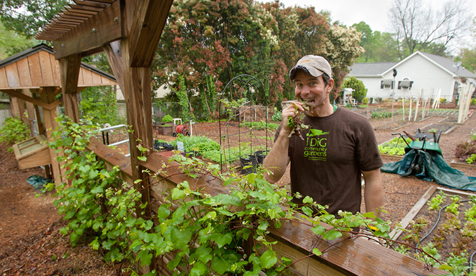For those who think that Carrboro is the only place in the Triangle where you can find locally grown foods, guess again. Just a few blocks from the heart of downtown Cary there is a small but growing community garden that produces organic food in a sustainable way — and grows more than 2,500 pounds of produce each year.
The garden’s founder and organizer, Cary resident and real estate agent Keith Bliss, became interested in the local foods movement after realizing how expensive the organic foods were that he and his wife were buying for their children. He and his family began to frequent local farmers markets and research other opportunities, but were drawn to the idea of growing their own food.
He said, “At first, I was pretty disheartened that there weren’t any community gardens in Cary that I could learn from or participate in. But it was so easy to tap into the people out there and learn more about how to begin very quickly.” He got the idea of starting the first community garden in Cary, and things took off very quickly.
From its beginnings in spring 2010, the garden was truly a communal effort. Donations of time, money and supplies poured in from neighbors, participants and local businesses. Nearly all of the supplies for building the raised seed beds were donated from Lowes Home Improvement, while the plants and seeds are contributed annually by local gardening companies like Campbell Road Nursery.
Volunteers from Bliss’ real estate group, Keller Williams, participated in building the garden and seed beds in 2010 to jump-start its creation. Bliss said, “We caught the right wave of the local foods movement. I was just really amazed at the amount of support for the garden right from the beginning.”
The garden is run by volunteers from the community, who work together to produce food that is then collected by the members and donated back to the community. Nobody owns a personal plot in Cary’s Pocket — all of the food is grown together, as a group. All members make decisions together, such as when to harvest and when to plant.
Currently, there are about 15 families who regularly contribute their time and energy to the garden. Members pay an annual fee to join, and commit to working at least four hours a month in the garden. They get to take whatever produce their family will use, and promise to share the rest with the other members.
But the people who work in the garden aren’t the only ones who benefit from its harvest. The members aim to donate at least 20 percent of the produce to the community and food banks. In 2010, they donated more than 600 pounds of produce to the Inter-Faith Food Shuttle of Raleigh.
The garden grows an amazing variety of foods, from nine varieties of tomatoes to watermelons to almost unheard-of plants like calendula. One of the best benefits of belonging to the garden is the great-tasting produce. Bliss said, “There’s an unbelievable difference with how good the food tastes. Tomatoes actually taste like tomatoes. I can taste the minerals and nutrients in the flavor. You don’t get stuff like that from the grocery store.”
Right now, the organization is focused on improving existing processes and produce . Bliss said, “This year we really just want to concentrate on one thing: growing food. We have aspirations for other things — outreach and education, for example — but we want to get really good at what we already do.” In the future, however, Bliss hopes to get more people involved in the community garden project by bringing the garden to their neighborhood.
“As we move forward with this whole project, my goal is to blueprint this garden and introduce it to every neighborhood in Cary, to see if there are any homeowners’ associations that would want to put this into their system,” said Bliss. “They’ve got the pool and the tennis courts, but there’s nowhere for people to get together and grow food. And you’d be surprised to see how many people really want that opportunity.”
If you’re interested in Cary’s Pocket, visit its Facebook page.










